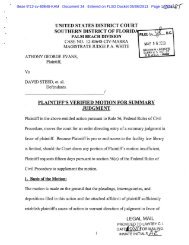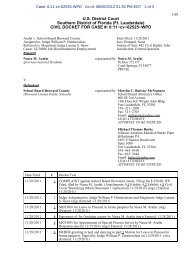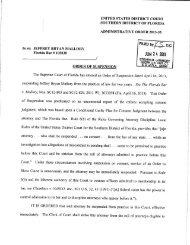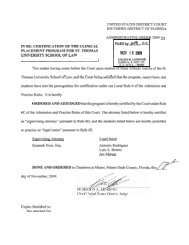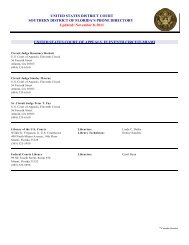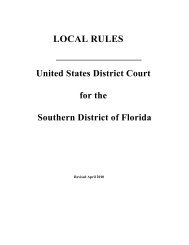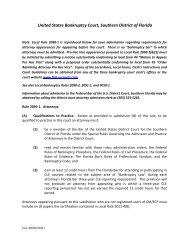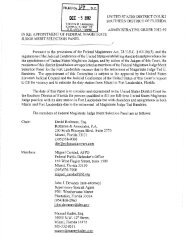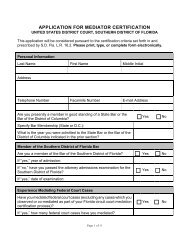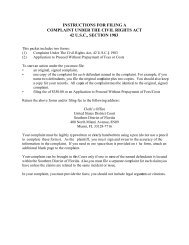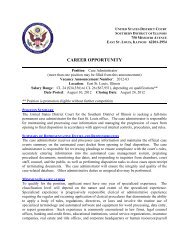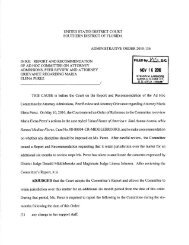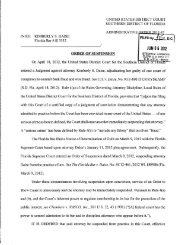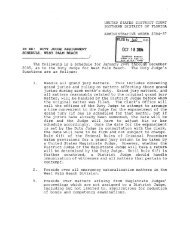JAN j 6 2010 - United States District Court
JAN j 6 2010 - United States District Court
JAN j 6 2010 - United States District Court
Create successful ePaper yourself
Turn your PDF publications into a flip-book with our unique Google optimized e-Paper software.
the <strong>Court</strong> may order that discovery be filed with the <strong>Court</strong> in order to<br />
preserve the integrity of the information. However, such practice is<br />
only permitted after the <strong>Court</strong> has determined, upon timely motion, that<br />
filing with the <strong>Court</strong> is necessary to safeguard the interests jeopardized<br />
by the normal discovery process. When such situations arise, counsel are<br />
encouraged to formulate agreements governing discovery that minimize the<br />
judicial role in administering routine discovery matters.<br />
(3) Filings Under Seal. Documents, electronically stored information and<br />
things may be filed under seal in accordance with the procedures set<br />
forth in Local Rule 5.4.<br />
C. Supplementing Answers. The Federal Rules of Civil Procedure expressly<br />
provide that in many instances a party is under a duty to supplement or<br />
correct a prior disclosure or response to include information thereafter<br />
acquired. See Federal Rule of Civil Procedure 26(e). A party may not,<br />
by placing supplementation language at the beginning of its discovery<br />
request, expand the obligations of another under the Federal Rules of<br />
Civil Procedure.<br />
D. Timeliness and Sanctions.<br />
(1) Timeliness of Discovery Responses. The Federal Rules of Civil<br />
Procedure set forth explicit time limits for responses to discovery<br />
requests. Those are the dates by which a lawyer should respond; counsel<br />
should not await a <strong>Court</strong> order. If a lawyer cannot answer on time, an<br />
extension of time should first be sought from opposing counsel. If<br />
unable to resolve the matter informally, counsel should move for an<br />
extension of time in which to respond, and inform opposing counsel so<br />
that, in the meantime, no unnecessary motion to compel a response will be<br />
filed. See Local Rule 26.1-r^(i) requiring a certificate that counsel<br />
have conferred before seeking judicial relief.<br />
(2) Extensions of Time. Motions for extension of time within which to<br />
respond to discovery should be filed sparingly and only when counsel are<br />
unable informally to resolve the matter with opposing counsel. Counsel<br />
should be aware that the mere filing of a motion for an extension of time<br />
in which to respond does not, absent an order of the <strong>Court</strong>, extend the<br />
deadline for responding to discovery requests. See Local Rule<br />
7.l.A.3(a) (3) .<br />
(3) Objections. When objections are made to discovery requests, all<br />
grounds for the objections must be specifically stated. When objections<br />
are untimely made, they are waived. See Local Rule 26.1.C.3.a(g)(3)(A).<br />
(4) Sanctions. Because lawyers are expected to respond when the Federal<br />
Rules of Civil Procedure require. Federal Rule of Civil Procedure 37<br />
provides that if an opposing lawyer must go to <strong>Court</strong> to make the<br />
recalcitrant party answer, the moving party may be awarded counsel fees<br />
incurred in compelling the discovery. Federal Rule of Civil Procedure 37<br />
is enforced in this <strong>District</strong>. Further, if a <strong>Court</strong> order is obtained<br />
compelling discovery, unexcused failure to provide a timely response is<br />
treated by the <strong>Court</strong> with the gravity it deserves; willful violation of<br />
a <strong>Court</strong> order is always serious and may be treated as contempt.<br />
88



